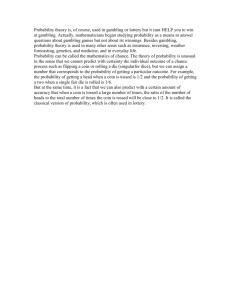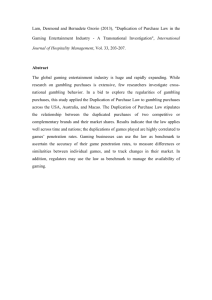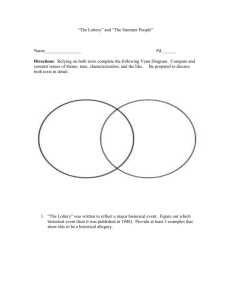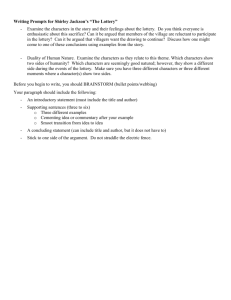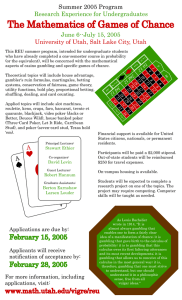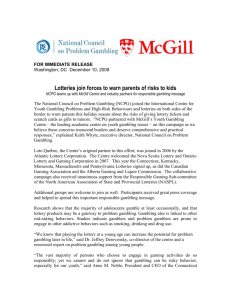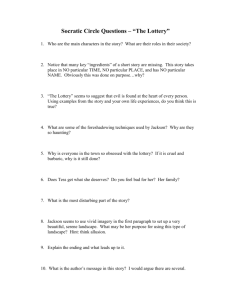California is once again has accepted such a wager.' The
advertisement
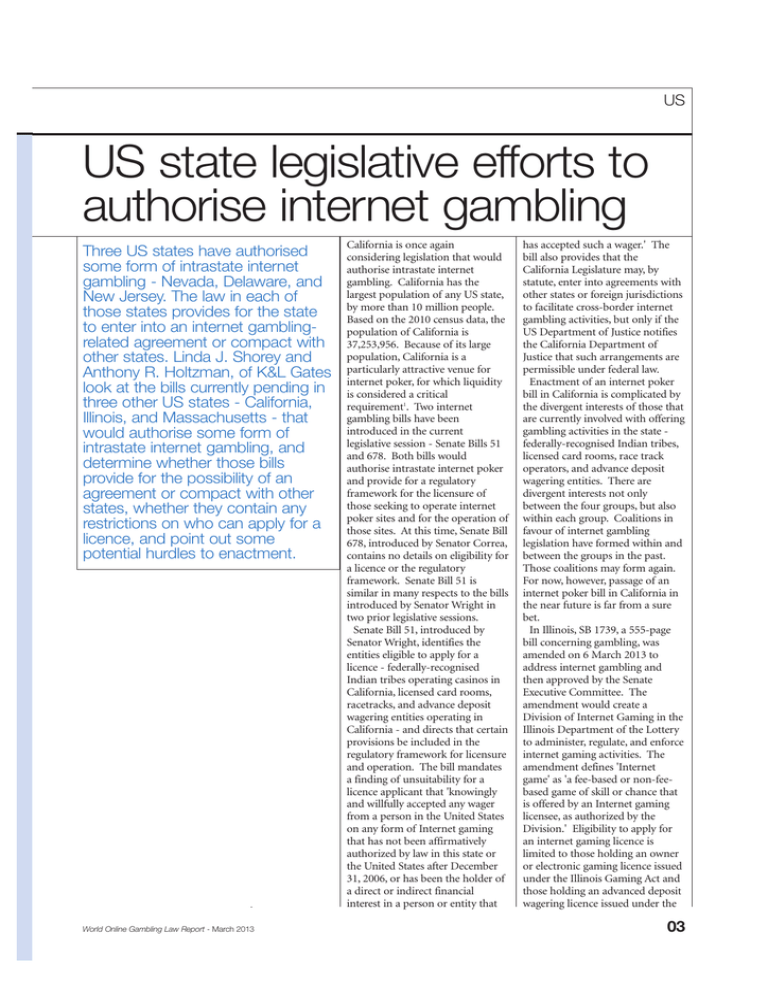
US US state legislative efforts to authorise internet gambling Three US states have authorised some form of intrastate internet gambling - Nevada, Delaware, and New Jersey. The law in each of those states provides for the state to enter into an internet gamblingrelated agreement or compact with other states. Linda J. Shorey and Anthony R. Holtzman, of K&L Gates look at the bills currently pending in three other US states - California, Illinois, and Massachusetts - that would authorise some form of intrastate internet gambling, and determine whether those bills provide for the possibility of an agreement or compact with other states, whether they contain any restrictions on who can apply for a licence, and point out some potential hurdles to enactment. World Online Gambling Law Report - March 2013 California is once again considering legislation that would authorise intrastate internet gambling. California has the largest population of any US state, by more than 10 million people. Based on the 2010 census data, the population of California is 37,253,956. Because of its large population, California is a particularly attractive venue for internet poker, for which liquidity is considered a critical requirement1. Two internet gambling bills have been introduced in the current legislative session - Senate Bills 51 and 678. Both bills would authorise intrastate internet poker and provide for a regulatory framework for the licensure of those seeking to operate internet poker sites and for the operation of those sites. At this time, Senate Bill 678, introduced by Senator Correa, contains no details on eligibility for a licence or the regulatory framework. Senate Bill 51 is similar in many respects to the bills introduced by Senator Wright in two prior legislative sessions. Senate Bill 51, introduced by Senator Wright, identifies the entities eligible to apply for a licence - federally-recognised Indian tribes operating casinos in California, licensed card rooms, racetracks, and advance deposit wagering entities operating in California - and directs that certain provisions be included in the regulatory framework for licensure and operation. The bill mandates a finding of unsuitability for a licence applicant that 'knowingly and willfully accepted any wager from a person in the United States on any form of Internet gaming that has not been affirmatively authorized by law in this state or the United States after December 31, 2006, or has been the holder of a direct or indirect financial interest in a person or entity that has accepted such a wager.' The bill also provides that the California Legislature may, by statute, enter into agreements with other states or foreign jurisdictions to facilitate cross-border internet gambling activities, but only if the US Department of Justice notifies the California Department of Justice that such arrangements are permissible under federal law. Enactment of an internet poker bill in California is complicated by the divergent interests of those that are currently involved with offering gambling activities in the state federally-recognised Indian tribes, licensed card rooms, race track operators, and advance deposit wagering entities. There are divergent interests not only between the four groups, but also within each group. Coalitions in favour of internet gambling legislation have formed within and between the groups in the past. Those coalitions may form again. For now, however, passage of an internet poker bill in California in the near future is far from a sure bet. In Illinois, SB 1739, a 555-page bill concerning gambling, was amended on 6 March 2013 to address internet gambling and then approved by the Senate Executive Committee. The amendment would create a Division of Internet Gaming in the Illinois Department of the Lottery to administer, regulate, and enforce internet gaming activities. The amendment defines 'Internet game' as 'a fee-based or non-feebased game of skill or chance that is offered by an Internet gaming licensee, as authorized by the Division.' Eligibility to apply for an internet gaming licence is limited to those holding an owner or electronic gaming licence issued under the Illinois Gaming Act and those holding an advanced deposit wagering licence issued under the 03 US Illinois Horse Racing Act. Licences could not be granted to applicants that 'accepted wagers via the Internet in contravention of [the amendment's provisions] or United States law in the 10 years preceding the application date.' And a licensee could accept wagers from persons not present in Illinois only 'if the Division determines that such wagering is not inconsistent with federal law or the law of the jurisdiction, including any foreign nation, in which any such person is located, or such wagering is conducted pursuant to a multijurisdictional agreement that is not inconsistent with federal law to which [Illinois] is a party.' Also in Illinois, SB 1955 would amend the Illinois Lottery Law to expand the pilot program for the online sale of individual lottery tickets, which is currently underway, to include (in addition to Lotto, Mega Millions, and Powerball) four additional types of lottery tickets - Lucky Day Lotto, My3, Pick 3, and Pick 4. While the passage of the Illinois legislation that provided for the pilot program was heralded as an authorisation of internet gambling, permitting the online sale of lottery tickets is not the same as permitting the games to be played via the internet. Accordingly, at this point in time, it does not appear that SB 1955's proposed expansion of the types of tickets the Illinois Lottery can sell over the internet is incompatible with SB 1739's proposal for the authorisation and regulation of internet gambling. It is difficult to set the odds that SB 1739 will become law. The current Governor of Illinois has vetoed two prior gambling expansion bills, which were similar to one another. However, neither of them addressed internet gambling. Whether the inclusion of internet gambling in the current 04 It is difficult to set the odds that SB 1739 will become law. The current Governor of Illinois has vetoed two prior gambling expansion bills, which were similar to one another. However, neither of them addressed internet gambling. bills will help or hinder enactment remains to be seen. In Massachusetts, two bills have been introduced concerning internet gambling - one related to the Massachusetts Lottery and the other related to holders of the authorised casino licences that have yet to be awarded. Senate Bill 101 would amend the law governing the Massachusetts Lottery to give the Massachusetts Lottery Commission authority to offer online lottery games. Two amendments are pertinent. Section 1 of the bill would expand the Commission's authority to conduct a state lottery, allowing it to conduct 'a lottery or lotteries conducted online or over the internet.' Section 2 of the bill would allow the Commission to enter into agreements with other states or jurisdictions to 'create and maintain multijurisdictional lottery games,' including games conducted online if 'any such lottery or lotteries conducted online or over the internet has been properly authorized by each state or other jurisdiction that is part of the group.' In this context, a 'group agreement' means 'any lottery activity in which the commission participates pursuant to a written agreement between the commission, on behalf of the commonwealth [of Massachusetts], and any state, territory, country or other sovereignty.' Senate Bill 197 would permit those that eventually are awarded a casino licence under existing Massachusetts law to apply for an 'Internet Gaming License' that, if approved, would permit the licensee 'to conduct gaming operations via the internet, provided that such operations do not include or reflect gaming mechanisms operated by the state lottery program of those simulating or resembling slot machines.' The two bills, at least in their current from, can be read together without conflict. The Massachusetts Lottery would be able to offer lottery games, which are typically games of pure chance, over the internet, even if they looked like a slot machine. And it appears that casino operators who obtained an internet gaming licence could offer online poker and other table games. It is, however, too early to predict what may happen to these bills during the legislative process. Linda J. Shorey Partner Anthony R. Holtzman Associate K&L Gates linda.shorey@klgates.com anthony.holtzman@klgates.com Readers should be aware that this article reflects the state legislative situation as it existed when the article was drafted in mid-March 2013. Events may occur between drafting and publication that cause some or all of the information to be out-of-date at the time of publication. For example, the bills described in the article may be amended or bills may be introduced in other states. 1. The next five most populous US states, based on the 2010 census, are: Texas (25,145,561); New York (19,378,102); Florida (18,801,310); Illinois (12,830,632); and Pennsylvania (12,743,948). For comparison's sake, the 2013 population estimates for six European countries that have authorised some form of Internet gambling are: France (65,951,611); Italy (61,482,297); Spain (47,370,542); Belgium (10,444,268); Bulgaria (6,981,642); and Denmark (5,556,452). See http://en.wikipedia.org/wiki/List_of_Europ ean_countries_by_population. World Online Gambling Law Report - March 2013

